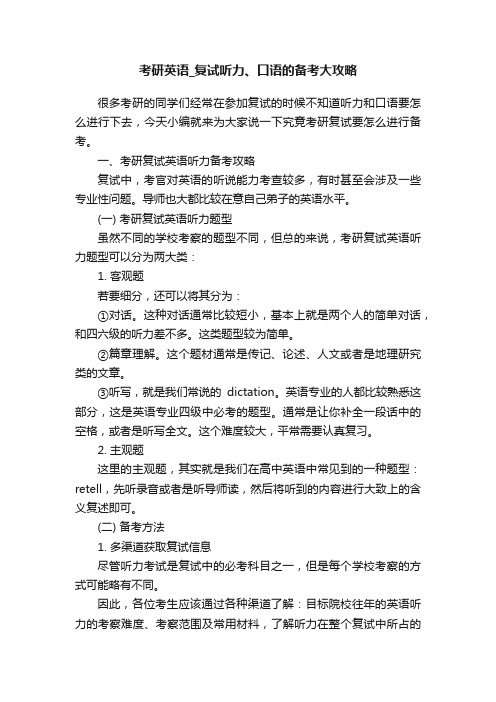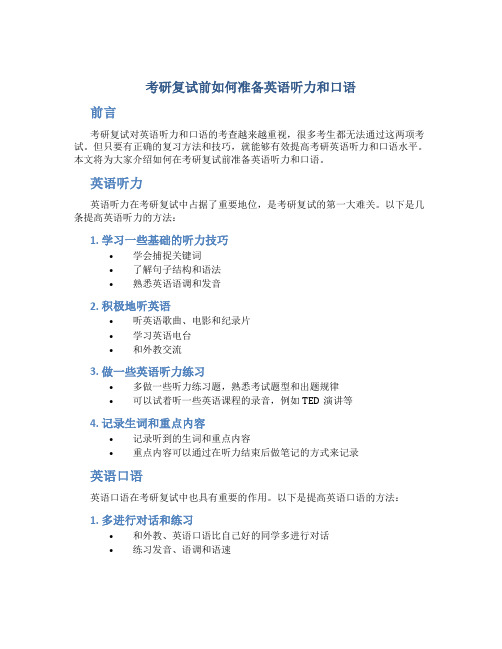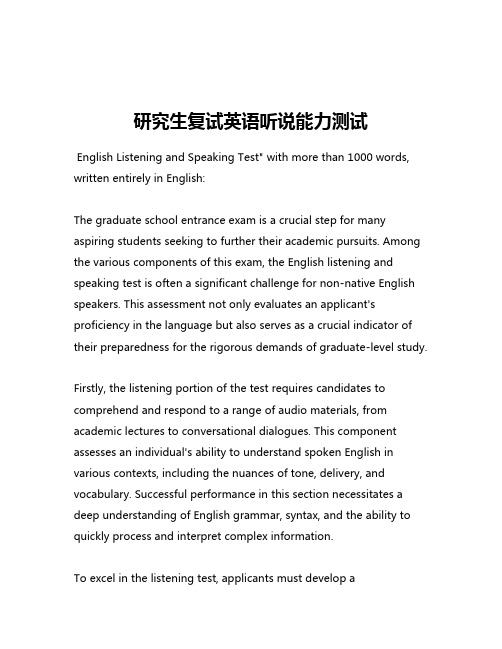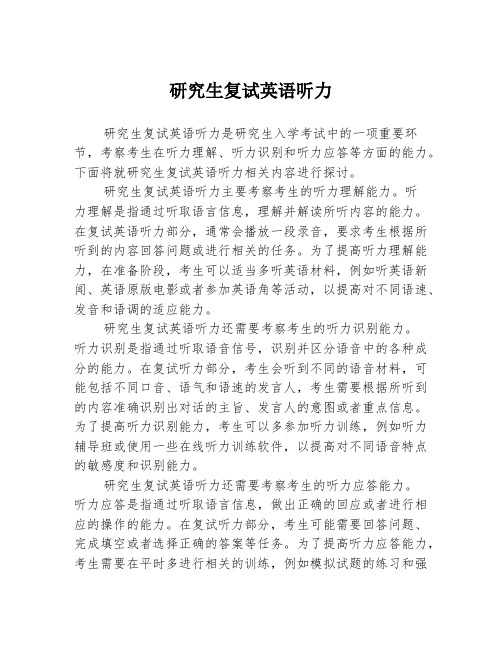研究生复试英语听力
考研英语复试听力技巧

考研英语复试听力技巧考研复试英语听力备考方法选取正确的听力材料英语听力部分,大多数学校都以现有的成熟考试为参考。
大家在准备听力复试的过程中,对于现有的成熟英语考试的听力部分一定要重视。
要做到在考研复试中对英语听力有针对性的准备,选取正确的听力材料是重中之重。
要做到从自己的实际能力出发来选取听力材料,太难或者太简单都不利于考生正确地对自己的听力能力进行评估,正常速度的听力材料即可。
如:六级听力、托福听力和雅思听力,在准备的过程中可以有针对性地练习这部分的真题,听力难度可根据自己的实际情况进行由易到难的选择,做到有步骤,有阶段的听力准备。
VOA的全称是:VoiceofAmerica(美国之声),它是美国的一个广播电台。
BBC的全称是:BritihBroadcatingCorporation(美国广播公司),它是英国的一家广播电台。
由此可见,VOA和BBC对于考生来说重要的区别就是VOA属于美式英语的发音,而BBC则是英式英语的发音。
2.语速新闻听力的语速通常分为慢速、中速和快速三种。
不同院校根据各自需求会选取符合自身需求的语速新闻听力进行考察,通常情况下,大部分院校会选择中速听力进行考察。
3.考察形式通常情况下,听力考察形式主要分为两种:选择题和填空题。
由于新闻听力对于大部分考生来说,较之报告、演讲等其它形式较难,因此在考察的过程中选择题的考查形式比较常见。
1、课程major---专业coure---课程intenivecoure---集训课程ditanceeducationunit远程教育课程coureduration---课程时长lecture---讲座、大课tutorial---小课eion---学期creditpoint---学分coreubject---核心课程elective/optional/electiveubject---选修课mandatoryubject---必修课yllabu---教学大纲te某tbook---课本lecturenote---讲义internhip---practicum---课eminar---研讨会2、applicationform---申请表applicant---申请人regiter---注册LetterofOffer---录取通知LetterofConditionalOffer---有条件录取通知deadline---截止日期cholarhip---奖学金orientationweek---入学周。
研究生复试英语测试听力,自我介绍的祷告

研究生复试英语测试听力,自我介绍的祷告篇1Prayer for Graduate School Interview Listening Test and Self-IntroductionDear Heavenly Father,As I prepare for my graduate school interview, I come before you with a heart full of gratitude for the opportunities you have blessed me with and a mind filled with excitement for the future.I know that you have guided me through this journey, and I trust that you will continue to be with me through this final stage of the application process.I pray for the listening test that I will be taking during the interview. Please grant me the focus and concentration to understand and respond to the questions effectively. Help me to listen attentively, process the information quickly, and provide thoughtful answers. May your wisdom and knowledge guide me through each question, enabling me to showcase my language skills and communication abilities.I also pray for the self-introduction portion of the interview. Please help me to confidently and articulately introduce myself,highlighting my achievements, goals, and aspirations. Give me the words to express myself professionally and persuasively, leaving a positive impression on the interview panel. May my self-introduction reflect my passion for learning, my dedication to my field of study, and my readiness for the challenges of graduate school.Lord, I ask for your peace and reassurance as I prepare for this important interview. Help me to trust in your plan for my future and to remain calm and focused throughout the process. Thank you for your guidance and protection, and for walking beside me every step of the way.In your holy name, I pray. Amen.篇2Prayer for Graduate School Interview:Dear God,As I prepare for the graduate school interview, I come to you in prayer seeking your guidance and strength. I know that this interview is an important step towards my future and I pray that you will be with me every step of the way.I pray for clarity of mind and wisdom as I navigate the questions that will be asked of me during the interview. Help me to articulate my thoughts and ideas clearly and confidently. Give me the courage to speak from the heart and showcase my true self to the interviewers.I also pray for a calm and peaceful spirit during the interview. Help me to remain focused and composed, even when faced with challenging questions or situations. Let your presence be felt in the room, guiding my words and actions.Lord, I ask for your favor and grace to be upon me during this interview. May I impress the interviewers with my knowledge, skills, and passion for the field of study. Help me to convey my strengths and qualifications in a way that resonates with them.Above all, I surrender this interview into your hands, knowing that you have a plan and purpose for my life. Let your will be done as I walk this path towards my future. May this interview be a stepping stone towards the fulfilling of your divine plan for me.I thank you for your love and guidance, and I trust that you will lead me in the right direction. In Jesus' name, I pray.Amen.篇3Dear God,As I prepare for the Graduate School English Listening Test and the self-introduction portion of my interview, I come to you in prayer. I trust in your guidance and strength to help me through this important step in my academic journey.I pray that you will grant me the wisdom and clarity to understand the questions in the listening test. May you open my ears to hear the spoken words clearly and accurately. Help me to stay focused and calm, so that I can answer each question to the best of my ability.As I prepare to introduce myself to the interview panel, I ask for your guidance in choosing the right words to express who I am and what I aspire to achieve. May my self-introduction be confident, sincere, and engaging, reflecting my passion for the field I wish to study and my dedication to academic excellence.God, I know that you are with me every step of the way, guiding me through challenges and opportunities. I place my trust in you and know that you will be by my side during the Graduate School English Listening Test and the self-introduction.With your help, I am confident that I can showcase my skills and qualifications effectively.Thank you, God, for your love and support. I am grateful for the strength and courage you provide me as I face this important moment in my academic journey. Amen.。
考研英语_复试听力、口语的备考大攻略

考研英语_复试听力、口语的备考大攻略很多考研的同学们经常在参加复试的时候不知道听力和口语要怎么进行下去,今天小编就来为大家说一下究竟考研复试要怎么进行备考。
一、考研复试英语听力备考攻略复试中,考官对英语的听说能力考查较多,有时甚至会涉及一些专业性问题。
导师也大都比较在意自己弟子的英语水平。
(一) 考研复试英语听力题型虽然不同的学校考察的题型不同,但总的来说,考研复试英语听力题型可以分为两大类:1. 客观题若要细分,还可以将其分为:①对话。
这种对话通常比较短小,基本上就是两个人的简单对话,和四六级的听力差不多。
这类题型较为简单。
②篇章理解。
这个题材通常是传记、论述、人文或者是地理研究类的文章。
③听写,就是我们常说的dictation。
英语专业的人都比较熟悉这部分,这是英语专业四级中必考的题型。
通常是让你补全一段话中的空格,或者是听写全文。
这个难度较大,平常需要认真复习。
2. 主观题这里的主观题,其实就是我们在高中英语中常见到的一种题型:retell,先听录音或者是听导师读,然后将听到的内容进行大致上的含义复述即可。
(二) 备考方法1. 多渠道获取复试信息尽管听力考试是复试中的必考科目之一,但是每个学校考察的方式可能略有不同。
因此,各位考生应该通过各种渠道了解:目标院校往年的英语听力的考察难度、考察范围及常用材料,了解听力在整个复试中所占的分数权重,以及本专业对英语听力的要求程度等。
英语听力部分,大多数学校都以现有的成型考试为参考。
考生在复习时可以有针对性地做一些六级或托福听力或雅思听力或新闻英语听力的试题,找找做题的节奏和感觉。
在了解相关信息之后,考生可结合自己的情况,制定出相应的备考计划,进行针对性训练。
2. 精听和泛听相结合精听需要我们把每一个句乃至每一个单词都写出来。
在写的过程中,考生可以很快发现自己在哪一方面需要加强训练,是在语音方面、语调方面、词汇方面,还是文化背景知识方面。
泛听,是指考生听录音材料的时候,只需要将材料中的关键信息抓住,不必把听到的每一句都写出来。
国科大英语听力复试

国科大英语听力复试
国家科学技术大学英语听力复试是中国科学技术大学研究生招
生的一个重要环节,目的是测试申请者的英语听力水平和沟通能力。
复试考试通常分为听力、口语、阅读和写作四个环节。
听力部分通常包括两个部分,第一部分是听力理解,主要测试申请者对英语语音、语调、语速、口音等的听力理解能力;第二部分是听力应用,主要测试申请者对英语语境、语义、逻辑等的理解和应用能力。
常见的听力材料包括新闻报道、学术讲座、广播节目、电视剧片段等。
口语部分通常分为两个环节,第一部分是自我介绍,主要测试申请者的表达能力和自我推销能力;第二部分是问答环节,主要测试申请者的应答能力和交际能力。
问题通常涉及个人经历、学术兴趣、未来规划等方面。
阅读部分通常包括两个部分,第一部分是阅读理解,主要测试申请者对英语文章的理解能力和语言运用能力;第二部分是阅读应用,主要测试申请者对英语文章的分析和应用能力。
常见的阅读材料包括科学文献、新闻报道、社论评论、广告宣传等。
写作部分通常分为两个环节,第一部分是写作表达,主要测试申请者的英语写作能力和逻辑思维能力;第二部分是写作应用,主要测试申请者的英语应用能力和创新思维能力。
常见的写作题目包括议论文、观点阐述、问题解决、文化交流等。
总的来说,国家科学技术大学英语听力复试是一个基于申请者英
语水平的全面测试,要求申请者具备良好的听、说、读、写能力,以及跨文化交际能力和创新思维能力。
考研复试前如何准备英语听力和口语

考研复试前如何准备英语听力和口语前言考研复试对英语听力和口语的考查越来越重视,很多考生都无法通过这两项考试。
但只要有正确的复习方法和技巧,就能够有效提高考研英语听力和口语水平。
本文将为大家介绍如何在考研复试前准备英语听力和口语。
英语听力英语听力在考研复试中占据了重要地位,是考研复试的第一大难关。
以下是几条提高英语听力的方法:1. 学习一些基础的听力技巧•学会捕捉关键词•了解句子结构和语法•熟悉英语语调和发音2. 积极地听英语•听英语歌曲、电影和纪录片•学习英语电台•和外教交流3. 做一些英语听力练习•多做一些听力练习题,熟悉考试题型和出题规律•可以试着听一些英语课程的录音,例如TED演讲等4. 记录生词和重点内容•记录听到的生词和重点内容•重点内容可以通过在听力结束后做笔记的方式来记录英语口语英语口语在考研复试中也具有重要的作用。
以下是提高英语口语的方法:1. 多进行对话和练习•和外教、英语口语比自己好的同学多进行对话•练习发音、语调和语速2. 逐渐增大口语表达范围•逐渐增加词汇量,扩大口语表达范围•学习使用不同的口语表达方式和习惯用语3. 模仿外教发音•听外教讲课,模仿外教的发音和语调•学习美式或英式发音的区别4. 了解和学习口语考试评分标准•学习口语表述的结构和能量的要求•熟悉各项口语考试的评分标准,哪些方面可以得分总结考研复试对英语听力和口语的要求越来越高,通过学习并掌握上述方法,考生可以提高自己的英语听力和口语水平。
在考试前,考生还应该多做一些模拟考试和练习,以便更好地应对考试。
研究生复试英语听说能力测试

研究生复试英语听说能力测试English Listening and Speaking Test" with more than 1000 words, written entirely in English:The graduate school entrance exam is a crucial step for many aspiring students seeking to further their academic pursuits. Among the various components of this exam, the English listening and speaking test is often a significant challenge for non-native English speakers. This assessment not only evaluates an applicant's proficiency in the language but also serves as a crucial indicator of their preparedness for the rigorous demands of graduate-level study.Firstly, the listening portion of the test requires candidates to comprehend and respond to a range of audio materials, from academic lectures to conversational dialogues. This component assesses an individual's ability to understand spoken English in various contexts, including the nuances of tone, delivery, and vocabulary. Successful performance in this section necessitates a deep understanding of English grammar, syntax, and the ability to quickly process and interpret complex information.To excel in the listening test, applicants must develop acomprehensive understanding of academic English, which often includes specialized terminology and discourse patterns. This can be achieved through extensive exposure to English-language media, such as podcasts, lectures, and news broadcasts, as well as regular practice in comprehending and summarizing the main ideas and key details from these sources.Additionally, the speaking section of the graduate school entrance exam evaluates an applicant's ability to articulate their thoughts and ideas in a clear, coherent, and organized manner. This component may involve tasks such as delivering a short presentation, engaging in a structured discussion, or responding to prompts on a range of academic and personal topics.Effective preparation for the speaking test requires a multifaceted approach. Candidates must not only possess a strong command of English vocabulary and grammar but also develop the ability to organize their thoughts, maintain a logical flow of ideas, and communicate with confidence and clarity. Regular practice in public speaking, group discussions, and mock interviews can help applicants hone these essential skills.Moreover, the speaking test often assesses an individual's ability to think critically and respond spontaneously to unexpected questions or scenarios. This requires a deep understanding of the subjectmatter, as well as the ability to think on one's feet and articulate nuanced responses. Engaging in discussions with native English speakers, participating in debate clubs, or seeking feedback from language tutors can be invaluable in developing these crucial abilities.One of the key challenges faced by non-native English speakers in the graduate school entrance exam is the need to balance their academic knowledge with their language proficiency. Applicants must not only demonstrate their expertise in their chosen field but also convey their ideas effectively in English, which may not be their primary language.To overcome this challenge, candidates can adopt a holistic approach to their preparation. This may involve seeking out language-learning resources, such as English conversation classes, online language-learning platforms, or private tutoring, to strengthen their overall English skills. Additionally, they can practice integrating their academic knowledge with their language abilities by engaging in mock interviews or writing practice essays on relevant topics.Furthermore, the graduate school entrance exam's English listening and speaking test often assesses an applicant's ability to adapt to different communication styles and contexts. This may includeresponding to questions from panel members with diverse backgrounds, engaging in discussions with peers from various cultural and linguistic contexts, or presenting to an audience with varying levels of English proficiency.Developing cultural awareness and the ability to communicate effectively in diverse settings can be crucial in navigating the graduate school entrance exam. Candidates can enhance these skills by participating in international student organizations, attending cross-cultural events, or engaging in virtual exchanges with peers from different countries.In conclusion, the English listening and speaking test in the graduate school entrance exam is a significant hurdle for many non-native English speakers. However, with a comprehensive and strategic approach to preparation, applicants can develop the necessary skills to excel in this component of the exam. By focusing on improving their overall English proficiency, integrating their academic knowledge with language abilities, and cultivating cultural awareness and adaptability, candidates can increase their chances of success and pave the way for their future academic and professional endeavors.。
研究生复试英语听力

研究生复试英语听力研究生复试英语听力是研究生入学考试中的一项重要环节,考察考生在听力理解、听力识别和听力应答等方面的能力。
下面将就研究生复试英语听力相关内容进行探讨。
研究生复试英语听力主要考察考生的听力理解能力。
听力理解是指通过听取语言信息,理解并解读所听内容的能力。
在复试英语听力部分,通常会播放一段录音,要求考生根据所听到的内容回答问题或进行相关的任务。
为了提高听力理解能力,在准备阶段,考生可以适当多听英语材料,例如听英语新闻、英语原版电影或者参加英语角等活动,以提高对不同语速、发音和语调的适应能力。
研究生复试英语听力还需要考察考生的听力识别能力。
听力识别是指通过听取语音信号,识别并区分语音中的各种成分的能力。
在复试听力部分,考生会听到不同的语音材料,可能包括不同口音、语气和语速的发言人,考生需要根据所听到的内容准确识别出对话的主旨、发言人的意图或者重点信息。
为了提高听力识别能力,考生可以多参加听力训练,例如听力辅导班或使用一些在线听力训练软件,以提高对不同语音特点的敏感度和识别能力。
研究生复试英语听力还需要考察考生的听力应答能力。
听力应答是指通过听取语言信息,做出正确的回应或者进行相应的操作的能力。
在复试听力部分,考生可能需要回答问题、完成填空或者选择正确的答案等任务。
为了提高听力应答能力,考生需要在平时多进行相关的训练,例如模拟试题的练习和强化训练,以提高在有限时间内对所听到的信息进行有效处理和应答的能力。
总之,研究生复试英语听力是研究生入学考试中的重要环节,对考生的听力理解、听力识别和听力应答能力进行考察。
考生在准备阶段应多听英语材料,提高对各种语音特点的适应能力,并进行相关的听力训练,以提高自己在复试英语听力中的表现。
中国疾控中心研究生英语复试听力

中国疾控中心研究生英语复试听力全文共3篇示例,供读者参考篇1China CDC Graduate English Listening TestThe China Center for Disease Control and Prevention (China CDC) is one of the premier public health institutions in the country. As part of the admissions process for its graduate program, all applicants are required to take an English listening test as a means of evaluating their language proficiency. This test is crucial as it assesses the ability of prospective students to understand spoken English, an essential skill for conducting research, communicating with international colleagues, and accessing scholarly information in the field of public health.The English listening test consists of a series of audio recordings covering a range of topics related to public health, epidemiology, and disease control. These recordings are sourced from various sources, including academic lectures, news broadcasts, and interviews with experts in the field. The test is designed to challenge students' listening comprehension skillsby exposing them to different accents, speech patterns, and levels of formality in spoken English.During the test, applicants are required to listen to each recording carefully and answer a set of multiple-choice or short-answer questions based on the content. This requires students to actively engage with the material, identify key information, and demonstrate their understanding of complex concepts presented in spoken English. The test duration typically lasts between 60 to 90 minutes, depending on the number and length of the audio recordings.Success in the English listening test is essential for gaining admission to the China CDC graduate program. Strong listening skills enable students to participate effectively in coursework, seminars, and research activities conducted in English. Additionally, proficiency in listening comprehension enhances students' ability to engage with international research publications, collaborate with colleagues from diverse backgrounds, and present their work at global conferences.To prepare for the English listening test, applicants are encouraged to practice listening to a variety of English materials, such as podcasts, TED talks, and online lectures. Familiarizing oneself with different accents and speech styles can helpimprove listening comprehension skills and build confidence in understanding spoken English. Moreover, practicing active listening techniques, such as taking notes, summarizing key points, and asking clarifying questions, can enhance students' ability to extract essential information from audio recordings.Overall, the English listening test is a critical component of the admissions process for the China CDC graduate program. By assessing students' listening comprehension skills, this test ensures that successful applicants are well-equipped to communicate effectively in English and engage with the global public health community. Through diligent preparation and active listening practice, prospective students can enhance their chances of success in the test and position themselves for a rewarding academic journey at the China CDC.篇2China CDC Graduate School English Listening TestIntroductionThe China Center for Disease Control and Prevention (China CDC) is an institution dedicated to preventing and controlling the spread of diseases in China. As part of its ongoing efforts to train professionals in the field of public health and epidemiology,the China CDC offers a graduate school program that includes an English listening test as part of the admissions process. In this article, we will discuss the format and content of the China CDC Graduate School English listening test.Test FormatThe China CDC Graduate School English listening test is a timed exam that consists of multiple-choice questions. The test is divided into several sections, with each section focusing on different listening skills such as understanding main ideas, identifying details, and making inferences. Students are required to listen to recorded passages and answer questions based on the information they hear.Test ContentThe listening passages in the China CDC Graduate School English listening test cover a wide range of topics related to public health and epidemiology. Some passages may discuss the latest research findings in the field, while others may focus on specific diseases or public health initiatives. Students may also be required to listen to conversations between healthcare professionals or public health experts in various scenarios.PreparationTo prepare for the China CDC Graduate School English listening test, students are encouraged to practice listening to a variety of English-language materials such as podcasts, news broadcasts, and academic lectures. It is also helpful to familiarize oneself with common English medical and public health vocabulary to better understand the content of the listening passages. Additionally, students may benefit from taking practice tests to improve their listening skills and build confidence for the actual exam.ConclusionThe China CDC Graduate School English listening test is an important component of the admissions process for students seeking to pursue a career in public health and epidemiology. By preparing thoroughly and honing their listening skills, students can increase their chances of success on the test and gain admission to this prestigious institution. Good luck to all prospective students taking the China CDC Graduate School English listening test!篇3China Centers for Disease Control and Prevention (China CDC) is a prestigious research institution in the field of publichealth in China. It has been actively engaged in various research areas related to preventing and controlling infectious diseases, chronic diseases, and other public health issues. As part of its effort to train the next generation of public health professionals, China CDC offers graduate programs to students who are interested in pursuing a career in public health research.The graduate program at China CDC is highly competitive, and the admission process is rigorous. One of the key components of the admission process is the English listening test during the interview. The purpose of the test is to assess the applicants' English listening skills, which are essential for conducting research and communicating with international colleagues in the field of public health.During the English listening test, applicants will be required to listen to a series of recorded lectures or conversations on various public health topics. They will then be asked to answer multiple-choice questions based on the content of the recordings. The test is designed to evaluate the applicants' ability to comprehend English spoken at a natural pace and to extract key information from complex technical discussions.To prepare for the English listening test, applicants are advised to practice listening to English-speaking podcasts,lectures, and conversations on public health topics. They should also familiarize themselves with common medical and public health terms in English to improve their vocabulary. Additionally, applicants can benefit from participating in English conversation groups or enrolling in language courses to enhance their listening skills.Overall, the English listening test at China CDC's graduate program interview is an important assessment tool to determine the applicants' proficiency in English listening and their readiness to engage in research and communication in the field of public health. By preparing adequately and demonstrating strong listening skills, applicants can improve their chances of successfully gaining admission to the prestigious graduate program at China CDC.。
- 1、下载文档前请自行甄别文档内容的完整性,平台不提供额外的编辑、内容补充、找答案等附加服务。
- 2、"仅部分预览"的文档,不可在线预览部分如存在完整性等问题,可反馈申请退款(可完整预览的文档不适用该条件!)。
- 3、如文档侵犯您的权益,请联系客服反馈,我们会尽快为您处理(人工客服工作时间:9:00-18:30)。
研究生复试英语听力
Research Graduate English Listening Test (700 words) Section 1: Short dialogues (20 questions)
1. M: What time is our group meeting tomorrow?
W: It's at 10 a.m. in the conference room.
2. M: Have you finished reading the article for today's class? W: No, I haven't had time to read it yet.
3. M: Did you enjoy the movie last night?
W: Yes, it was very entertaining.
4. M: Are you going to the university party this weekend? W: Yes, I'm planning to go with some friends.
5. M: Can I borrow your notes from the lecture?
W: Sure, I can lend them to you after class.
6. M: I can't find my keys anywhere.
W: Have you checked your jacket pocket?
7. M: What do you think of the new professor?
W: I think she is very knowledgeable and approachable. 8. M: Can you help me with my math homework?
W: Of course, I'd be happy to assist you.
9. M: What's the weather like today?
W: It's sunny and warm, perfect for going out.
10. M: Would you like some tea or coffee?
W: I'll have a cup of tea. Thank you.
Section 2: Longer dialogues (5 questions)
You will hear a conversation between two people discussing a news article. Listen to the dialogue and answer the following questions.
11. What is the news article about?
12. Why does the man find the article interesting?
13. What is the man's opinion on the topic discussed in the article?
14. What does the woman think about the article?
15. What action does the woman plan to take after reading the article?
Section 3: Academic lecture (5 questions)
You will listen to a lecture by a professor on the topic of climate change. Listen to the lecture and answer the following questions.
16. How does climate change affect the ecosystem?
17. What are some of the solutions suggested by the professor to
mitigate climate change?
18. What role does deforestation play in climate change?
19. What are the consequences of rising sea levels?
20. What can individuals do to help combat climate change? Note: The answers to the questions will not be provided here. This is only a sample listening test; actual test questions may vary.。
